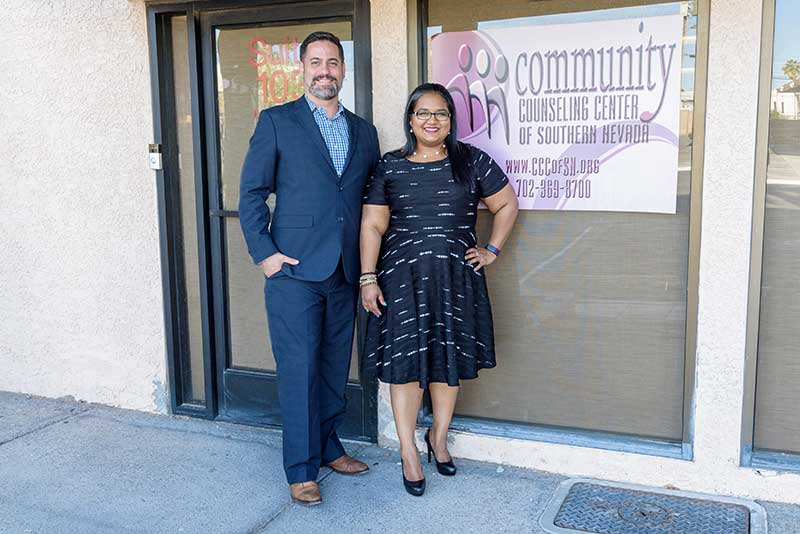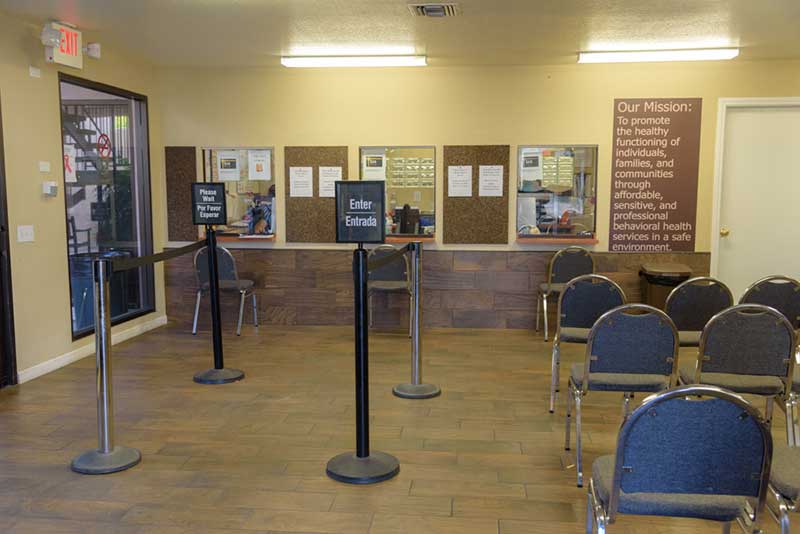
This article was printed in
Chic Compass Magazine – Issue 8

Exterior view of the Community Counseling Center of Southern Nevada
The Community Counseling Center
A SAFE PLACE FOR COMPASSIONATE & PROFESSIONAL MENTAL HEALTH CARE
BY BETTY BOYD
Mental health is a subject that society has stigmatized, and no one wants to talk about it. It includes depression, anxiety, and other pressures and affects everyone in varying degrees. The Community Counseling Center [“CCC”] normalizes these issues, along with the fear that people have in taking that first step in getting treatment.
One of the most critical elements of destigmatizing mental health challenges is providing a client-focused approach and creating a safe space for compassionate and professional care. Education is essential for understanding and normalizing the idea that mental health is not a debilitating condition. It could be as simple as being burned out and having difficulty doing daily tasks or dealing with grief. There is nothing too small that can qualify as a mental health issue.
COVID-19 seemed to change everything overnight and has had a significant impact on all of us. The CCC responded by quickly adapting and moving all of its services to telehealth. They made sure there was no lapse in coverage, and every client got the treatment required. Over the past year, the telehealth platform has been the primary way clients have obtained their mental health needs.
The specific patient population is the very under-served, from low to no income and some homeless. Telehealth has proven to be a great advantage, especially keeping people safe. Transportation can be a barrier. The use of smart devices, such as a smartphone, enabled them to receive their services without having to get on multiple buses to reach their destination.
Another benefit of telehealth was checking in on people that could not get transportation or were isolated. The counselors offered a tremendous service by being a point of contact, meeting emotional and psychological needs.
Over the past year, because of the pandemic, depression has dramatically increased among the patients that the CCC serves. They were already struggling with varying degrees of mental health issues and now had little to no interaction with others.

Executive Director, Patrick Sena-Bozarth & Deputy Director, Aaronell Mata
The Executive Director, Patrick Sena-Bozarth, states, “By still being present in their lives, by checking in and focusing on their treatment helped to alleviate some of the stress and depression someone was going through.”
As a private/non-profit community-based corporation, the CCC will continue with the telemedicine format to serve the entire Vegas Valley community. Typically, the primary population is the under-served.
The CCC is also a United Way Agency and relies on different entitlements to help in its funding. These include grants, and clients must meet specific eligibility requirements, such as a sliding payment scale based on income.
The CCC is a training site for student interns who can earn credit hours toward a degree. The intern works under the supervision of a CCC counselor, which enables interns to get experience in treating patients. A client can take advantage of this option at a reduced cost.
“All of these funding options enable the CCC to offer current services and expansion as needed,” says The Deputy Director, Aaronell Matta.
Getting the word out is very important, and the CCC has an extensive social media presence. They use email lists and have close partnerships with local media that include TV, news, and print. Other meaningful collaborations are with hospitals, doctors, state agencies, and the LBGTQ+ Center (on-site services through the Affirmation Program).

Community Counseling Center Lobby
The CCC offers other areas of help that include substance abuse. The counselors are trained in both mental health and substance abuse treatment.
Another critical aspect is case management. Case management helps clients get linked to other services in the community. These can include medical, dental, housing, financial assistance, food banks, and resume writing, to name just a few.
The CCC originally started as providing HIV/AIDS counseling, which they still offer. They provide medical case management, which helps with medical appointments, medication compliance, and other case management services.
Partnerships are a significant part of collaboration within the community. The CCC has affiliations with doctors, schools, state agencies, and hospitals.
They work jointly with the Department of Justice and the criminal justice system population, providing treatment to help in the rehabilitation of these individuals. They work with such entities as Juvenile Justice, child protective services, and probation. The various treatments supplied include family counseling, reuniting children, and improving the community’s health, enabling individuals to get back on their feet.

Community Counseling Center Resource
The CCC has an adolescent program (ages12 and up) where they run a Chat Room for teenagers, and concurrently there is the Parent’s Place. Each of these groups helps both parents and young people voice their concerns in private communication channels. These programs help parents and adolescents find a safe way to work together in identifying and resolving their problems.
The CCC plans to expand its outreach to the 12 and under population with mental health components, education, and socialization services but geared toward those under 12.
Mental health care needs to be regular, not just when a crisis occurs. The Executive Director states, “Create an idea within society to bring regular ongoing discussions and awareness, and this will address the problems we are currently dealing with.”
To learn more and find how to get help, please visit www.cccofsn.org.
